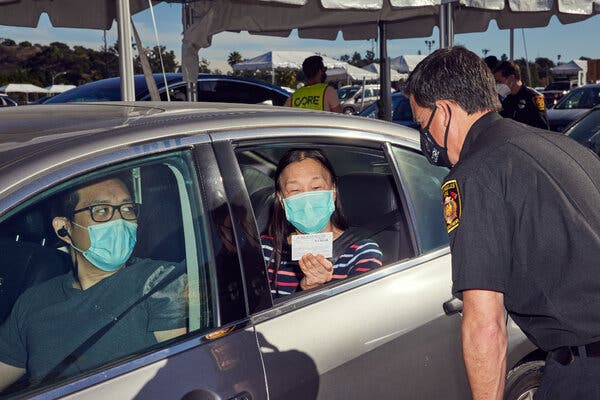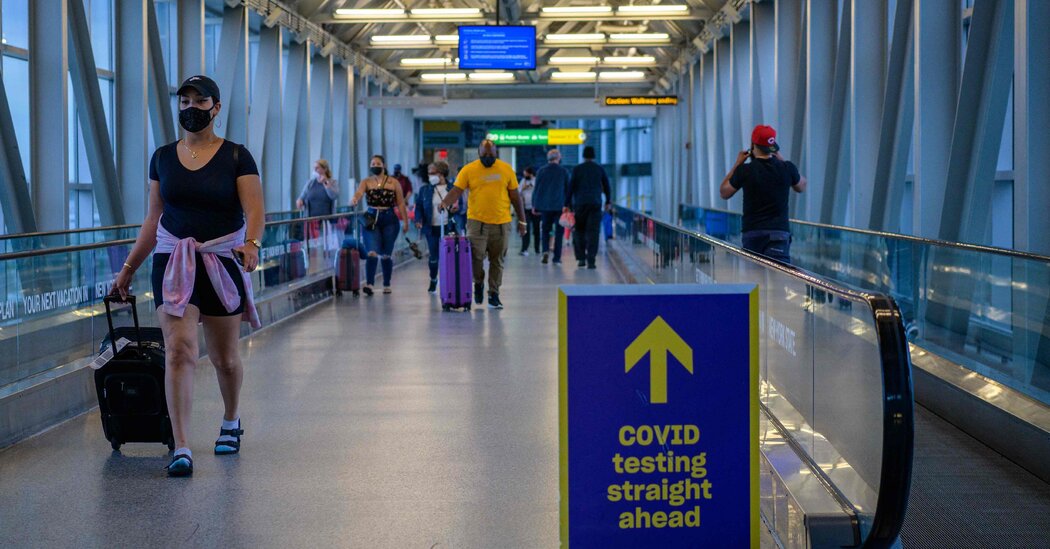Why Getting Tested for Covid-19 Can Include a Headache
Coronavirus testing prices vary widely and can reach into the hundreds of dollars, making it hard for some travelers to budget for the added expense.For those who have been traveling internationally during the pandemic, getting a coronavirus test has become an integral part of the process. Many countries, including the United States, require a negative test result for entry, which has forced travel agents, hoteliers and others to establish testing and authentication procedures and, in many cases, to work together to ease the process for travelers.As testing requirements have become more ubiquitous, so have testing centers and services catering to them, with little or no current regulation on what they charge. Depending on where they are going, travelers can find tests for free or must pay up to hundreds of dollars — an expense for which they haven’t necessarily budgeted.For Princess François-Estévez, 32, an assistant principal at a Brooklyn high school, the cost of testing was a consideration when choosing the destination for her bachelorette party. Ms. François-Estévez said her group of friends weighed the cost of airfare, lodging and testing to narrow down their choices. They considered going to Antigua before learning that a test at the affordable hotel they had found would cost them $200 per person.“You can have a cheaper flight and hotel, but then if the Covid test is so expensive, then you’re like, ‘Does it actually balance itself out?’” she said. “Especially when you’re traveling in a group, not everybody is willing to pay those costs.” They ended up going to Jamaica, staying at a resort that provided free testing.It is unclear to what extent American travelers have been deterred by the cost of testing, but a recent survey of 1,200 British adults by YouGov, a research data and analytics group, found that 47 percent named coronavirus testing prices as a main barrier to international travel.Julia Simpson, the chief executive officer of the World Travel & Tourism Council, an industry group that works with governments to raise awareness about the travel industry, said that testing requirements have “really affected people’s confidence and also their pockets in terms of traveling.”Ms. Simpson said that in the United States, some clinics charge fees ranging from $100 to $400 for polymerase chain reaction, or P.C.R. tests, considered the gold standard for detecting the virus.“One of the concerns we’ve had is these big price discrepancies,” Ms. Simpson said. “If you’re a family of four, or even a solo traveler, if you know what you’re going to pay, then at least you can budget for it. But for P.C.R.s, it can be very, very variable.” Gerald Kominski, a professor of health policy and management at the University of California, Los Angeles, said that the reason for the vast difference in pricing is a lack of government oversight, which “creates an opportunity for a company to, in some cases, exploit the fact that prices are not regulated.”In New York City, residents can get a free P.C.R. test at one of the city’s Express Covid-19 testing centers, with results promised within 24 hours or less. But many clinics offer the tests at a cost in exchange for expedited results. ProHealth Pharmacy, in Manhattan, charges $100 for a 24- to 48-hour turnaround for a P.C.R. test, or $200 to get results in 15 minutes. Adams Health Services offers express P.C.R. testing in Terminal One of Kennedy International Airport for $220, with results delivered within a couple of hours.Janine Aranya, the business development director for Adams Health Services, said in an email that their prices reflect the “cost of hiring airport employees and having responsibilities for the Department of Health.” She added that their advanced testing machines allow them to run each swab on site, as opposed to in batches like other laboratories, often returning results in less than an hour.“Most of our customers need the Covid-19 test when they are denied from check-in due to governmental regulation changes about Covid-19 constantly,” she said. “Our existence is a big advantage for passengers to catch their flights on the same day or next.”Clear-19 Rapid Testing, which has a location in Midtown Manhattan and is opening another in Downtown Manhattan, charges $389 to deliver P.C.R. results in two hours, or $175 for a 24-hour turnaround.“You’re basically paying for guarantees with us,” said Sandy Walia, a spokeswoman for the testing center. “We charge something that is predictable, affordable, with guaranteed results.”Some travelers do not mind paying a fee for peace of mind. When Amartya Zarate, a 32-year-old program manager, was getting ready to head to Portugal in September, she considered going to one of the many free testing sites in Cambridge, Mass., where she lives. But she was “really nervous” about getting her results within the 72-hour window that country requires.“It is a free service. It’s not like you can say, ‘I need this today,’” she said, so she opted to pay a $75 rush fee to get her results guaranteed in 48 hours. “I didn’t want to stress out about getting my results on time.”While testing is guaranteed in the United States to be free for patients who are symptomatic, some insurers may deny virus testing claims meant to clear people for work or travel.“Travel is not considered an essential activity for most people,” Dr. Kominski said. “We’re seeing people paying, and paying some high prices, when you’re required to have a negative test for reasons that are unrelated to symptoms, per se, but are for safety purposes.”Diane Sherer, the owner of Beyond Travel, an agency based in Los Angeles, Calif., said that Covid-19 testing prices have not deterred her clients. Many of the luxury resorts and hotels Ms. Sherer works with provide testing at no cost, she said, and she’s found when there is an added cost — usually around $150 — “people are willing to pay that little bit extra,” she said. “I haven’t had anyone cancel because of cost.”In the United States, it can be easy to shop around online for the best price or access affordable local options. But this can be more difficult in other countries, where tourists often do not know the language or how to navigate a foreign health care system.Limor Decter, a luxury travel advisor at Embark Beyond, a New York City-based agency, said that prices have dropped significantly since the beginning of the pandemic, in part because in May, the Centers for Disease Control and Prevention approved for travel the use of self-administered “at-home” tests that met its requirements, such as a video supervision by a lab technician and an emergency use authorization from the Food and Drug Administration.52 Places to Love in 2021We asked readers to tell us about the spots that have delighted, inspired and comforted them in a dark year. Here, 52 of the more than 2,000 suggestions we received, to remind us that the world still awaits.Available tests include the BinaxNOW Covid-19 Home Test, an antigen test that costs $70 for two kits or $99 for three. Other tests are pricier, with some requiring that the sample be sent to a laboratory for a P.C.R. test, and do not include a video conference with a lab technician, which is required for C.D.C. approval.Vault, a P.C.R. test, offers an at-home test kit for travel from Jamaica, Mexico and the Dominican Republic to the United States. The kits cost $119 and include a video session with a qualified professional; there are drop-off points for samples across these countries’ major cities, with results of the P.C.R. test returned 12 to 48 hours after being received by the lab.Antigen tests, rapid tests that can be processed within minutes, like an at-home pregnancy test, are cheaper but less reliable than P.C.R. tests, which are handled by a laboratory and include amplifying the virus’s genetic material many times, allowing it to detect even small traces of the virus. Both are accepted for travel to the United States, but some countries require a P.C.R. test for entry.Ms. Decter said that BinaxNOW is “very cost-effective,” adding that Embark Beyond purchased the kits in bulk for its clients, many of whom use it for their return trips back to the United States. The tests, which clients can get shipped to their home or pick up at a local Walgreens, can be packed in a suitcase and self-administered with the supervision of a lab technician, over video chat.Because such a cost-effective method is available, as well as the availability of no- or low-cost testing at many hotels worldwide, Ms. Decter said she does not believe that pricing is hindering travel at this point — for those who want to travel.“Clients are either comfortable, and they’ll do whatever it takes. Or they’re very patient and they say, I’d rather wait,” Ms. Decter said. “But we don’t have people in the gray zone.”Dr. Kominski, of U.C.L.A., said that pricing is likely particularly a deterrent for families, who have to consider the cost of multiple people when planning a trip.Jennifer P. Tejada, 32, a special-education teacher in Brooklyn, went to Cartagena, Colombia, with her husband and two daughters in August. The family budgeted around $20 per person to get tested before heading back to the United States. A friend who had gone recently recommended a clinic there.But when Ms. Tejada arrived at the clinic, the cost was more than double that amount, an expense she “wasn’t expecting.” The price, she was told, had gone up in the two weeks since her friend had visited.Ms. Tejada had hoped to visit the National Aviary of Colombia, but she decided to skip it. “I had in mind that we needed to use that money to get Covid-19 testing,” she said, “so it did keep us from doing an excursion that I really, really wanted to do.”Allison Brown, 71, who is retired and lives in Portland, Maine, said that testing is one of many things that makes traveling now “a pain in the neck.” Over the summer, she and her husband spent $475 on coronavirus tests to enter Scotland and visit their adult children living there. For the tests required to return to the States, Ms. Brown would have paid an additional $225 had it not been for a relative who works at a local clinic and helped them get tested free of charge.“If I was just going on a leisure vacation, I wouldn’t go,” said Ms. Brown, “but I want to see my children.”Follow New York Times Travel on Instagram, Twitter and Facebook. And sign up for our weekly Travel Dispatch newsletter to receive expert tips on traveling smarter and inspiration for your next vacation. Dreaming up a future getaway or just armchair traveling? Check out our 52 Places list for 2021.
Read more →


